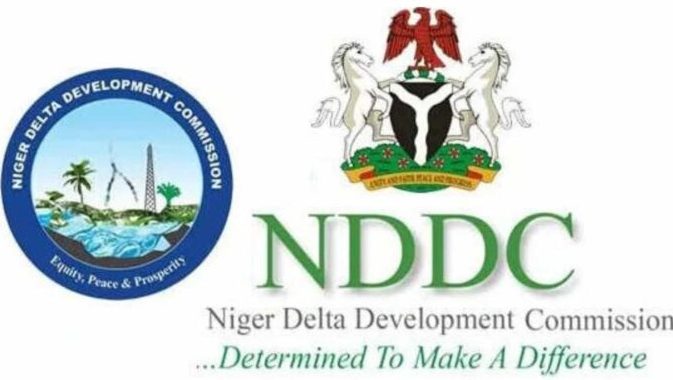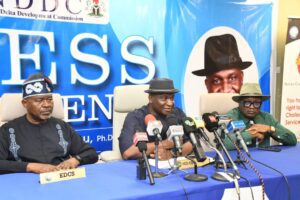
Stakeholders seek active Advisory Committee for NDDC
Niger Delta Stakeholders have stressed the urgent need to re-activate the Niger Delta Development Commission, NDDC, Advisory Committee, as provided for in its Establishment Act, to advise and monitor the activities of the Commission.
This was part of the resolutions contained in a communique issued at the end of the Niger Delta Stakeholders Summit 2024, which took place at the Obi Wali International Conference Centre in Port Harcourt, Rivers State.
The summit, which brought together stakeholders to deliberate on issues affecting the region and its development, with a view to further transform it, agreed that all funds due and outstanding to the NDDC from statutory sources (including the Federal Government and ecological fund) be vigorously pursued and recovered.
The stakeholders underscored the importance of increased synergy between the NDDC and the Advisory Committee to achieve more efficiency and activate all organs provided for in the Act.
The stakeholders addressed the issue of development agencies working at cross purposes and resolved that measures must be taken “to avoid duplication of projects and efforts in the region by ensuring robust consultation between the NDDC and the nine member states in project implementation.”
The summit affirmed: “There is urgent need to remove the NDDC from the TSA Policy, as it limits the Commission from fully achieving its interventionist mandate. That the Federal Government should strictly adhere to the tenure provisions of the NDDC Act and avoid the incessant dissolution of Boards of the Commission and the aberrant issue of Interim Managements to run the affairs of the Commission. Also, the Commission should be insulated from Political interference which puts undue pressure on the leadership of the Commission.
They also agreed “that additional sources of funding for the NDDC such as at least 3 percent of VAT revenue should be legislated.”
The stakeholders resolved that funding the implementation of the regional development strategy should be done through three sources: Traditional budget sources; Public Private Partnerships; Development Finance.
To support the funding plans, they agreed that the initiation of the Niger Delta Development Bank, NDDB, to drive the mobilisation of development finance from local and global sources should be given priority. “Loans should be given to SMEs within the region to drive economic and industrial growth.”
The communique stated: “There is urgent need to complete the East-West Road which was awarded nearly twenty years ago, to ease transportation across the region.
It further called for a thorough consideration of the NDDC (Establishment) Act, with a view to initiating amendments of the Act, where necessary.
On the issue of preparing a new roadmap for development, the stakeholders resolved that “proper planning is crucial to any development and therefore the review of the Niger Delta Regional Development Masterplan, appropriate data gathering was essential to any realistic development plan. There must be quantitative and qualitative input from key stakeholders in preparing or reviewing the Masterplan.”
According to the communique, “the region’s educational curriculum should be reviewed and designed to meet 21st century needs. Technical and vocational training must be given priority by creating Technical/Vocational training hubs. There should be improved funding of the region’s educational system.
It said further: “On healthcare, water, sanitation and hygiene, there should be sufficient funding of rural and community health centres and the training and retraining of the personnel to man them. The private sector should be engaged more in partnerships in these areas.”
The stakeholders made a case for women and youths, calling for more representation of women in all sectors of the region’s economy, adding that there should be programmes for Persons Living with Disability.
The communique posited: “On sports, tourism, culture and hospitality, there is need for sustained investment and capacity building in the region’s Entertainment and creative industries. Sports development in areas where the region has comparative advantage such as swimming and wrestling should be given serious attention. There is a need to have a special gathering for the creative industry.”
On the issue of the degradation of the environment through oil pollution, the stakeholders recommended a holistic remediation across communities in the Niger Delta to avoid compromise on cleaned areas, adding: “Government should uphold the provisions of Environmental Guidelines and Standards for the Petroleum Industry in Nigeria (EGASPIN) and enforce proper decommissioning of oil facilities.
The communique also gave the prescriptions of the stakeholders on varied issues: namely that modern technology should be deployed in project monitoring and evaluation; that there should be an integrated waste management plant which can convert wastes to wealth and that for erosion control and flood management, there should be canalization, shore protection and land reclamation projects.
Other areas addressed, included community sensitisation and enlightenment campaigns on ecological issues; biodiversity conservation and reforestation to stimulate mangrove restoration; creation of technology hubs within the region to drive creativity, innovation and the rapid development of the region in areas of artificial intelligence and diversification from oil and gas to agro-based regional economy.
The communique called for a regular convocation of stakeholder engagements.




